Advertisements
Advertisements
Question
Copy figure on your notebook and draw a perpendicular from P to line m using (i) set squares (ii) protractor (iii) ruler and compass. How many such perpendicular are you able to draw?
Solution
We draw perpendicular to m from P, using
(i) Set squares
Step I: Let m be the given line and p be a point outside m. Now, extended line m on both the sides.
Step II: Place a set square on m, such that one arm of its right angle aligns along m.
Step III: Place a ruler along the edge opposite to the tight angle of the set square.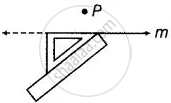
Step IV: Hold the ruler fixed. Slide the set square along the ruler till the point P touches the other arm of the set square.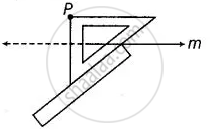
Step V: Join PM along the edge through P, meeting m at O.
Now, PO ⊥ m.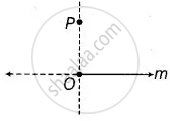
(ii) Protractor
Step I: Let m be the given line and P be a point putside m.
Step II: Place the protractor on point P, such that its centre coincides with point P.
Step III: Mark a point B againt the 90° mark on the protractor.
Step IV: Remove the protractor and draw a line l passing through P and B which intersects line m at O.
Then, PO ⊥ m.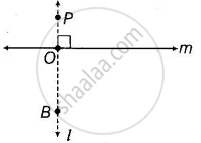
(iii) Ruler and compass
Step I: Given, a line m and a point P, not on it. Extend the given line in both directions.
Step II: With P as entre, draw an arc which intersects line m at two points A and B.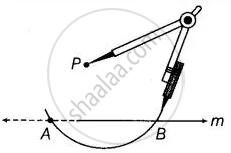
Step III: With A and B as centres and the same radius draw two arcs which intersect at a point, say Q, on the other side.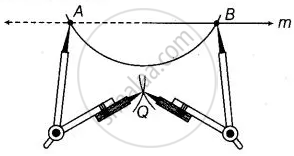
Step IV: Join PQ.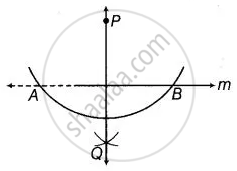
Thus, PQ is perpendicular to m.
We are able to draw one perpendicular line.
APPEARS IN
RELATED QUESTIONS
Draw a line segment of given length and construct a perpendicular bisector to line segment using scale and compass
8 cm
Draw a line segment of given length and construct a perpendicular bisector to line segment using scale and compass
5.6 cm
The line of symmetry of a line segment is the ______ bisector of the line segment.
Draw the images of points A and B in line l of figure and name them as A’ and B’, respectively. Measure AB and A’B’. Are they equal?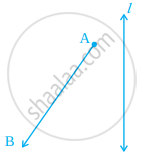
Copy figure on your notebook and draw a perpendicular to l through P, using (i) set squares (ii) protractor (iii) ruler and compass. How many such perpendiculars are you able to draw?
Draw an angle of 60° using ruler and compasses and divide it into four equal parts. Measure each part.
Bisect a straight angle, using ruler and compasses. Measure each part.
Bisect a right angle, using ruler and compasses. Measure each part. Bisect each of these parts. What will be the measure of each of these parts?
Draw a line segment of length 10 cm. Divide it into four equal parts. Measure each of these parts.
Repeat Question 6, if `overline"AB"` happens to be a diameter.
